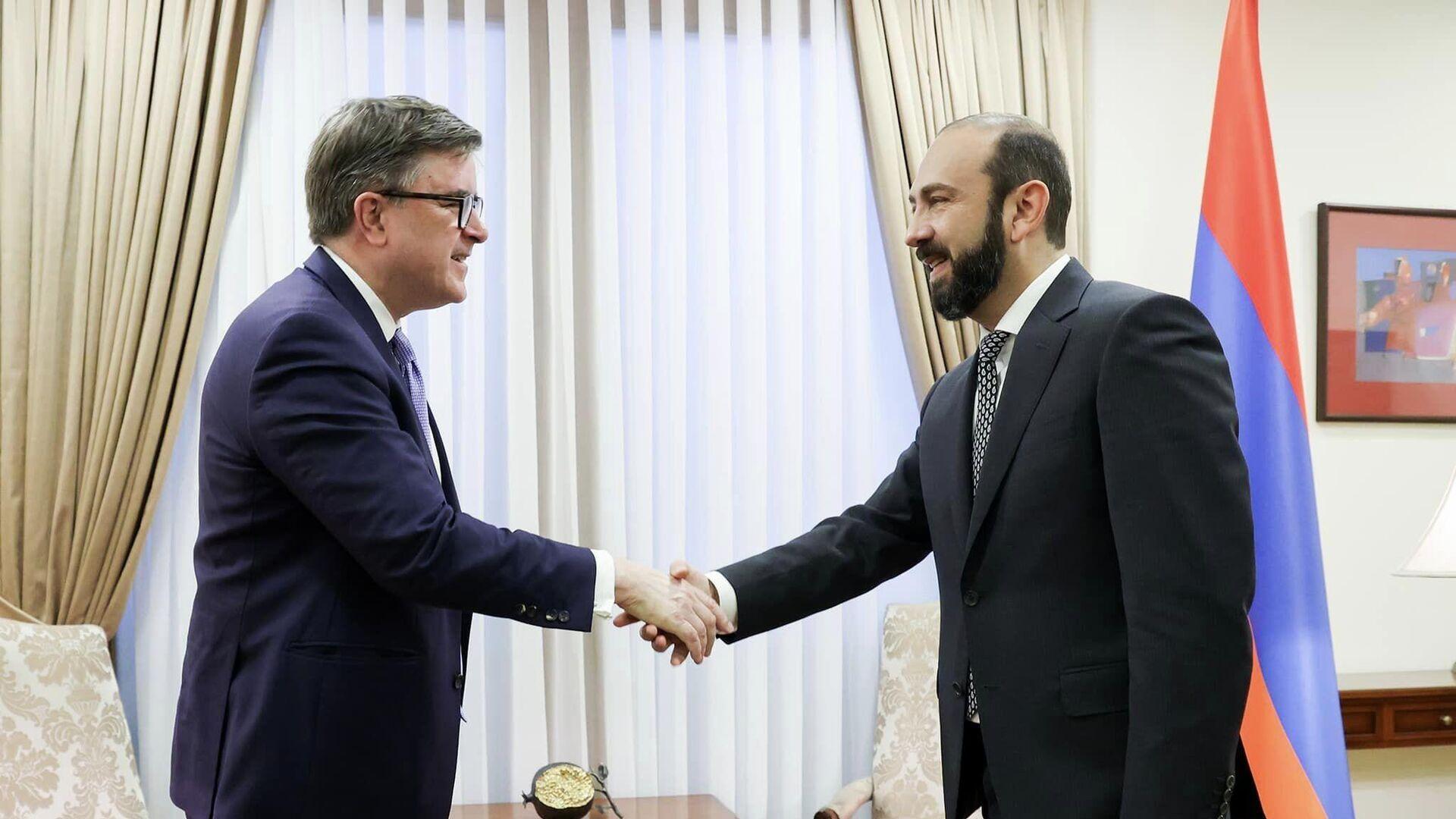Constitutional shift: Armenia's gateway to peace with Baku Will Washington push Yerevan to relinquish?
The final session of the Armenia-US Strategic Dialogue was held in Yerevan with the participation of Armenian Foreign Minister Ararat Mirzoyan and US Undersecretary of State for European and Eurasian Affairs James O'Brien. Earlier, the State Department said that the meeting would discuss the strengthening of bilateral relations and further steps. O'Brien also announced a discussion of "U.S. support for achieving a long-term and peaceful agreement between Armenia and Azerbaijan, including using the Almaty Declaration as a basis for border delimitation."
Mirzoyan echoed this sentiment, expressing optimism about the prospect of a peace agreement with Azerbaijan. He emphasized Armenia's commitment to normalizing relations and delineating borders based on mutual recognition of territorial integrity, as outlined in the 1991 Almaty Declaration. Additionally, Mirzoyan underscored Armenia's keen interest in unblocking regional communications, underlining principles of sovereignty, mutual respect, equality, and reciprocity.
However, it appears that Yerevan seeks maximum benefits without reciprocal actions. While aiming to position itself as a transit hub for communication projects, Armenia remains reluctant to amend constitutional provisions that assert territorial claims over Azerbaijan—a key demand from Baku.
Furthermore, Armenia's tactics seem to involve leveraging Prime Minister Pashinyan's potential attendance at COP29 in November. By suggesting that Pashinyan might skip the conference, Yerevan may be attempting to pressure Azerbaijan into compromising. The hope is that Azerbaijan will acquiesce to a peace treaty without insisting on changes to Armenian legislation. Yerevan seems to wager that the perceived benefits for Baku's image will outweigh strategic concerns regarding long-term security.
In the current situation, Baku not only maintains the existing conditions but also introduces new ones. One of these new conditions is President Ilham Aliyev's recent statement that Armenia should support Azerbaijan's proposal to officially dissolve the OSCE Minsk Group. The main requirement remains the same - the removal of clauses from Armenian laws (including the Constitution) that contain territorial claims to Azerbaijan.
It's worth noting that earlier, on June 7, the Armenian Foreign Ministry released a statement indicating that "the proposed peace agreement also includes a provision agreed upon by both parties, stating that neither party can use its domestic laws as a reason for not fulfilling its obligations under the peace agreement."
Yerevan thus refers to this clause of the treaty as a sufficient basis for levelling the clause of the Constitution containing territorial claims to Azerbaijan.

However, this is not the case. Firstly, this article merely repeats and enshrines a clause that is present in one expression or another in the constitutions of many countries of the world. For example, let us cite Article 5, paragraph 3 of the Basic Law of Armenia: ‘In case of contradiction between the norms of international treaties ratified by the Republic of Armenia and the laws of the Republic of Armenia, the norms of international treaties shall apply’. However, this paragraph may prevail over other legislative acts of the Republic of Armenia, but not over the basic law, because the third paragraph of Article 116 of the Constitution of Armenia clearly states: ‘International treaties contradicting the Constitution may not be ratified’. That is, the Constitution of the country has supreme legal force in Armenia under all circumstances.
Yerevan appears eager to navigate around constitutional constraints, yet Baku remains steadfast in denying such flexibility. It's possible that Washington may now lean on Baku to yield on this matter. However, given Baku's firm stance and increased international engagement in the region, it's more probable that Washington will ultimately apply significant pressure on Yerevan. Western strategists have likely recognized that the approach of managing regional conflicts through the "Armenian idea" has reached its limits. Consequently, to retain control over the situation, the emphasis must shift towards promoting long-term peace.
"We are working to contribute to the establishment of long-term peace in the region. We are also focused on expanding economic opportunities from Central Asia to the Mediterranean. If there is long-term peace between Armenia and Azerbaijan, those opportunities will be even greater," O'Brien said.
In order to involve Armenia in regional projects, it is necessary to politely request that it give up its territorial claims to its neighbours. If Washington is truly interested in Armenia's integration into global logistics, it should find the right approach for this.
As we have previously mentioned, Yerevan will likely need to find a reason outside the Azerbaijani context to change the constitution. One such reason could be a desire to signal its aspiration to join the EU, following the example of Georgia. Moreover, the EU offers Yerevan certain progress, such as a potential visa-free regime for Armenian citizens.
It seems reasonable for the United States to participate in this process, especially since there have been discussions about an enhanced partnership between Armenia, the EU, and the United States following the meeting in Brussels in April 2024. During the meeting with O'Brien, Mirzoyan mentioned, "Given the growing nature and dynamics of Armenian-American relations, we hope to elevate our strategic dialogue to the level of a new strategic partnership commission."
Indeed, it's a waiting game to observe whether Europeans and Americans will offer concessions to Armenians and how this might influence the country's legislation. The outcome of such negotiations could significantly shape Armenia's future direction and its approach to resolving regional conflicts.








